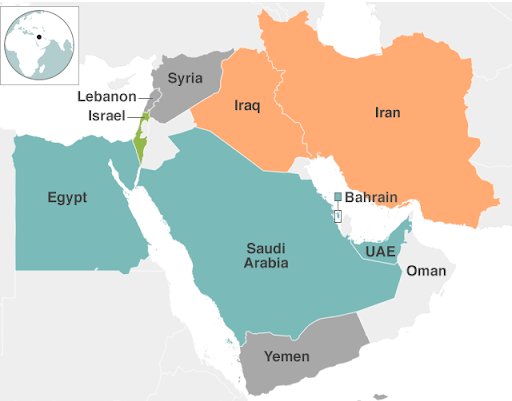International Relations
UAE-Israel Peace Treaty & India
This editorial analysis is based on the article “India’s geopolitical interests are in close alignment with moderate Arab centre” which was published in the Indian Express on 18th of August 2020. It analyses the peace pact between Israel and UAE and the Indian interest therein.
In a move that significantly impacts geopolitics of the world, Israel and the United Arab Emirates (UAE) has announced that they will normalise diplomatic relations. In a joint statement released by the US, Israel and the UAE, the leaders of the three countries agreed to “the full normalization of relations between Israel and the United Arab Emirates”.
The agreement is a historic diplomatic breakthrough that would advance peace in the Middle East region. This would not just serve the interest of the world but India too which has a huge stake in the middle east due to its cultural and trade tie-ups.
UAE-Israel Peace Deal & Its Importance
- Israel and the United Arab Emirates just agreed to a historic deal to normalize their long-strained relations.
- This move is significant because, with the exception of Jordan and Egypt, Israel does not have diplomatic relations with Gulf Arab states owing to its long-standing conflict with Palestinians.
- The agreement comes after Israel’s Prime Minister Benjamin Netanyahu agreed to suspend plans to annex parts of the West Bank, one that had been bitterly criticised by these Gulf Arab states, Europe and a few other countries around the world.
Arab-Israel Relation
- Since Israeli independence in 1948, it has fought several wars with Arab neighbouring countries.
- The persecuted Jews saw Israel as their promised home while Arabs saw it as an occupation.
- The Israel Arab conflict is one of the worst conflicts that has its root in the History, Religion and Geopolitics.
West Bank
- It is a landlocked territory in West Asia.
- It also contains a significant section of the western dead sea.
- It was captured by Jordan after the Arab Israel war in 1948
- However, Israel snatched it back during the Six-Day War of 1967 and has occupied it ever since.
- At present, there are around 130 formal Israeli settlements along with 26 lakh Palestinians at West Bank.
Impact of the Deal
The agreement could fast-track the changes that are already underway in the region.
- Tripolar Contest: The Saudi bloc (consisting of Egypt, the UAE, Bahrain and others) sees its interests being aligned with that of the U.S. and Israel and their support for Palestine, which Arab powers had historically upheld, is dwindling, while Turkey and Iran emerge as the strongest supporters of the Palestinians in the Muslim world.
- This tripolar contest is already at work in West Asia. The UAE-Israel thaw could sharpen it further.
- Setback to Palestinian Statehood: Unlike the past two Arab-Israeli peace agreements, Palestinians do not figure prominently in the current one. The Palestinians are understandably upset. They called the UAE’s decision “treason”
- However, Israel’s pledge not to go ahead with the annexation of one-third of the West Bank and the Jordan Valley, for the time being, will be cold comfort for the Palestinians.
- Further Deeping of Sectoral Divide: In all of this, a fault line in West Asia is likely to deepen between Sunni Muslim states and Iran, as well as that country’s allies in Syria and in Lebanon.
- These Sunni states, led by Saudi Arabia and UAE and backed by the United States in collaboration with Israel, are building a buffer against Iran.
Way Forward: How India Should Respond?
India’s geopolitical interests are in close alignment with stability in West Asia. Therefore, standing up for the region and opposing the forces of regional destabilisation should be at the very heart of India’s foreign policy in the region. In this context, India’s West Asia policy should adhere to following four principles.
- Acting as a Peace Negotiator: India should act as a mediator to normalize the relationship between West Asian countries, especially between Saudi Arabia, Israel, Turkey and Iran.
- Opposing Foreign Interventions in the Region: In the past, those came from the West and Israel. Today, most Arabs see the greatest threat to their security from Turkish and Iranian interventions.
- Aiding Arab Economic Integration: India should extend support to Arab economic integration, intra-Arab political reconciliation and the strengthening of regional institutions.
- Strengthening Ties With All Major Players in the Region: India’s geopolitical interests are in close alignment with those in the Arab Centre including Egypt, Jordan, Saudi Arabia, the UAE and Oman. Thus, India needs to make strong ties with the region.
Indian Interest in West Asia
- Geopolitically West Asia occupies an important position in international relations due to its geographical location and proximity to continents and countries South Asia, China, Central Asia, Europe, and Africa.
- The region is strategically significant due to its enormous energy resources, trade route links to different parts of the world.
- It is the world's largest oil-producing region accounting for 34% of world production, 45% of crude oil exports and 48% of oil proven reserves.
- India has been heavily dependent on energy supplies from the region, while Indian expatriates have constituted a substantial share of the regional labour market.
- Remittances from the region constitute a major chunk of total remittances to India.
|
Drishti Mains Question Analyse how the recent UAE-Israel peace deal will impact the region and India? |
This editorial is based on “NDHM will radically transform health care” which was published in The Hindustan Times on August 27th, 2020. Now watch this on our Youtube channel.





